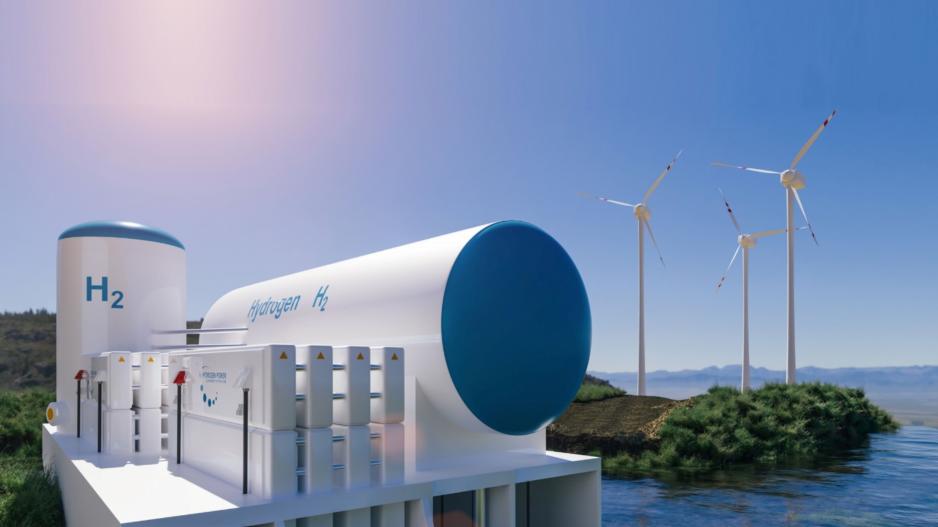Cyprus Positions Itself in Green Hydrogen Development for Europe
Hydrogen Can Transform “Unreliable” Renewable Energy Sources, Like Wind and Solar, Into Dependable Ones
Cyprus is gearing up to play a pivotal role in Europe's green hydrogen sector. The island nation, renowned for its geostrategic location between Europe and Asia, highlighted its commitment to renewable energy sources that could significantly boost the production and supply of green hydrogen to Europe. These details came to light during an informational session titled "Green Hydrogen in Cyprus" held in Nicosia.
The session was inaugurated by the Minister of Energy, Commerce, and Industry, Giorgos Papanastasiou. He emphasized that the government prioritizes reducing electricity costs for households and businesses. Simultaneously, the nation seeks to bolster its energy supply and contribute to Europe's efforts in diversifying its energy sources and routes.
In line with these objectives, Papanastasiou mentioned, "We are implementing policies to promote the use of renewable energy sources and energy-saving measures, interconnecting Cyprus with neighboring countries, and introducing natural gas - a less polluting fuel - for electricity generation."
The minister made reference to the National Plan for Energy and Climate, projected up to 2030. Notably, this plan recognizes the significant role hydrogen could play both as a fuel and energy source, vital for transitioning to a green economy.
Highlighting the European vision, Papanastasiou noted that the European Hydrogen Strategy aims to produce up to 10 million metric tons of renewable hydrogen in the EU by 2030. This target, under the REPowerEU initiative, is set to double, with the facilitation of imports, to achieve an additional 10 million metric tons of hydrogen by 2030.
"To develop Cyprus' National Hydrogen Strategy and incorporate hydrogen into our energy mix," Papanastasiou said, "the Ministry of Energy sought technical support from the European Commission. The resulting study suggests various methods to integrate hydrogen into Cyprus' energy palette, considering the country's unique aspects and the support expected from EU strategies and the REPowerEU plan."

On his part, the President of RAEK, Andreas Poulikkas, spoke about hydrogen's role in energy transition. He labeled the long-term scenario of EU transitioning from a carbon economy to a hydrogen one as "very optimistic". He delved into national hydrogen strategies and the economics of green hydrogen, especially when considering the competitive edge over other fuels in the light of greenhouse gas emission rights pricing.
Poulikkas highlighted that hydrogen can transform "unreliable" renewable energy sources, like wind and solar, into dependable ones. This is possible if hydrogen produced from these sources is stored and utilized across various economic energy sectors.
Mr. Poulikkas also spoke about the potential of "hydrogen valleys", self-sufficient energy communities that not only harness renewable energy sources but also channel this energy into electrolysis units to produce hydrogen. This hydrogen can then be commercialized within local networks. By 2050, he emphasized, oil will fade from the scene, with natural gas remaining in limited use. Hydrogen, however, will dominate various sectors, including its application in vehicles and aircraft, supported by the substantial penetration of renewable energy sources.
George Chatzimarkakis, Managing Director of Hydrogen Europe, expressed his optimism for Cyprus' role in the global hydrogen conversation. "Cyprus has access to wind and sun, and its pivotal geographical location means it's high time for the country to join the global discussion on shaping the hydrogen market," Chatzimarkakis remarked. He also highlighted Cyprus' influential voice within the EU Council and its technological expertise in this arena.
Makis Ketonis, President of the Cyprus Hydrogen Association, highlighted that 27 companies from Cyprus, Greece, the Netherlands, Lebanon, and Romania have collaborated on a proposal to establish a 'Hydrogen Cyprus Valley'. This initiative encompasses a range of activities centered around the production, utilization, and transformation of green hydrogen based in Cyprus.
Furthermore, Ketonis mentioned that a proposal from a member company to produce 150 tons of hydrogen annually for transportation purposes has been approved by the European Union. This initiative is set to receive co-funding of €4.5 million.
The symposium was a joint initiative by the Cyprus Hydrogen Association, Hydrogen Europe, and OEB.






